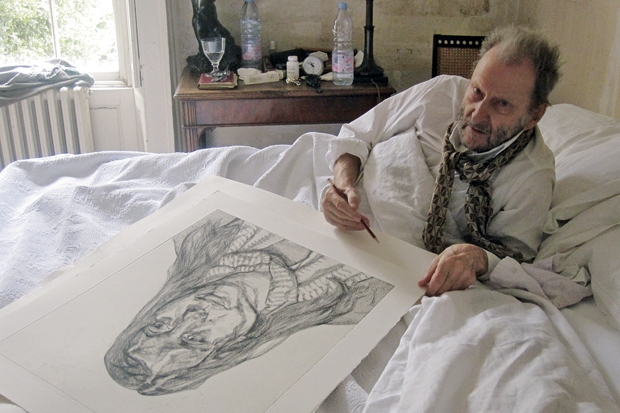According to the medical historian Professor Sonu Shamdasani, Sigmund Freud was not the best, nor actually the most interesting, psychoanalyst in early 20th-century Vienna. Rather, Freud’s genius lay in creating a loyalty cult around himself, collecting a group of acolytes who would ensure his reputation. This is worth bearing in mind when considering the life of his grandson, the painter Lucian Freud, who died in 2011.
Lucian was famous for his secrecy. ‘Devious and secretive. I have been described as that,’ he tells Geordie Greig, not without a certain pride. He demanded a strict omertà of his intimates. There was a great deal to be furtive about: vast gambling debts, literally hundreds of lovers, many children by many mothers; in one year alone, three of them born to three women. Almost no one had his telephone number and he kept people in compartments, so that they could not confer. (Someone of his grandfather’s profession might have observed that he thus split off parts of himself as a safeguard against his devouring mother.) Even the pictures in his studio were stacked with the paint facing the wall. One lover describes peeking at other portraits when the artist was out of the room, to find out who else he was involved with.
Geordie Greig, who knew him well, here reveals more about Freud than has ever been in print before. He has interviewed a quantity of friends, sitters, children and lovers who were willing to break their long silence.One of the most revealing interviews is with Freud’s bookmaker. The book is excellent on Freud’s extraordinary charisma, which worked its magic equally on women, men, animals and children. An especially charming passage — with accompanying photographs — describes Freud’s easy playfulness with Greig’s young children. The dark glamour is here, too: Freud drove Bentleys very fast, consorted with the Kray twins, played dangerous games of cat and mouse with bookies to whom he owed money, ate partridges with his bare hands and painted all night. ‘I like tension,’ says Freud.
The best portraits bring their sitters vividly to life, and this book does just that. There can be no greater compliment than to say that Greig makes the reader feel exactly as if they have met Lucian Freud. And what exhilarating company he is, to begin with: quoting poems, singing old Cole Porter songs, gossiping, making jokes. About his recently deceased (and hated) brother Clement Freud he quips: ‘He’s dead now. Always was actually.’ When James Goldsmith threatens to murder him if he ever paints Goldsmith’s daughter, Freud replies with a note: ‘Is that a commission?’
And yet. Freud was blithe about the fact that he only ever did exactly what he wanted to do; which, luckily for the gallery-visiting public, was paint. But an entirely selfish life leaves casualties. Some of these were minor: the waiters he tore into, the people he got into fist-fights with for no very real reason. Among those who knew and loved him, the damage was worse. Devoted to him though his children appear to have been, he was only ever a father on his own terms. Fairness didn’t come into it. He plainly liked some of them better than others, although Greig tries not to say this too loudly. They sat for him because it gave them the chance, perhaps their only chance, to spend time with him.
Freud fell out with people, sometimes spectacularly. He very seldom forgave. Many great artists have behaved badly: being unconventional is a badge of honour among them, after all. But what of vengefulness, cruelty, preying on the young, the weak? In this account, Freud appears to have systematically sought out and seduced the teenaged daughters and nieces of his former friends and lovers. Themselves the sometimes neglected children of artists, drinkers and writers, they were vulnerable and easily won. Greig describes a shameful episode in which Freud slept with the extremely fragile daughter of a woman who had left him many years before. Not long afterwards this young woman died of a heroin overdose, at 17. She was my childhood friend, as her mother had been my mother’s. She had long tangly hair and freckles. She was such a sweet girl.
We do not tolerate such behaviour in our light entertainers. Does being an important artist absolve Freud? While his stature as a painter is not, of course, affected by his private affairs, in the end this aspect of his life diminishes him and the myth of himself he took such pains to construct. The enchantment, the wit, the mystery, even the brooding and hawk-like physical beauty lose their allure.
Not that this seems to have been the intention of the author, who very much admired Freud, even loved him. But a good biographer must put the curiosity of the reader before the character of their subject, by which criterion Geordie Greig is a very good biographer indeed.






Comments